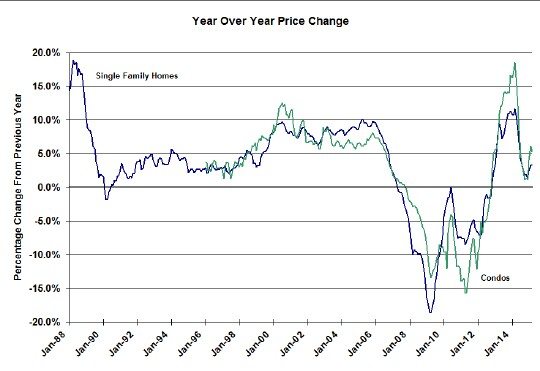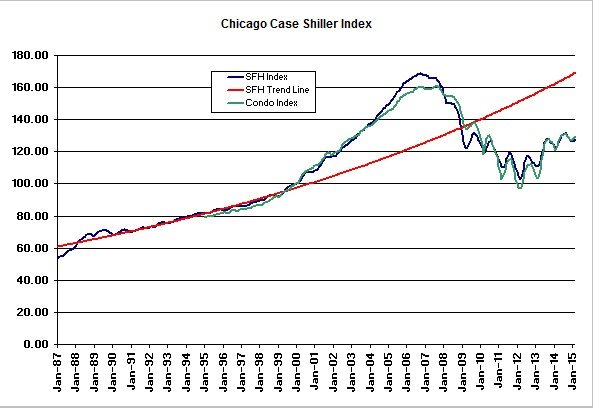Dow Jones Indices just released the March Case Shiller Home Price Index for the 20 metropolitan areas that they track, which includes Chicago. Once again the year over year advance in the Case Shiller Chicago index for single family homes strengthened a bit from the previous month, while the growth in the condo index weakened a bit. But both numbers are reasonably healthy.
Single family homes were up 3.4% in the last year and condo prices were up 5.3%. That’s 29 months in a row of price gains. You can see the long term picture in the graph below. 3.4% is in line with the historic average for Chicago so it really doesn’t represent any sort of catch up from the decline.
However, Chicago is still not seeing the kinds of price gains that other metropolitan areas have been experiencing. We are 6th from the bottom with the #1 spot going to San Francisco (no surprise) with a 10.3% gain.

We’re in the portion of the year when prices are rising so, compared to February, March single family home prices were up 0.9% and condo prices were up 1.2%. You can barely see that in the long term trend graph below so just take my word for it.
You can also see – or, rather, you don’t see the gap closing with that long term trend line in red. Admittedly that line was created during a period when inflation was a bit higher but I want to continue to track against it for the time being to see how it compares. I’m wondering if Chicago housing prices can outpace inflation by a significant amount. Anyway, we are still 24.4% below that line.In addition, what you can clearly see is that we are nowhere near the peak we reached in September 2006. In fact, single family homes are 24.2% below it and condos/ townhomes are 19.3% below it.
Nevertheless, we’ve had a decent recovery with single family home prices up 24.4% from the bottom in March 2012 (when I closed on my house – but admittedly there was a bit of luck involved there), with condo/ townhome prices up an even more impressive 32.0%.
Compared to where we’ve been single family home prices are lower than they were on average from February 2003 through February 2009 and condo prices are lower than the entire period from March 2003 to January 2010. So the average person who bought in these time periods is still screwed. That’s on AVERAGE. There are entire areas of the city that have fully recovered.
Here is the commentary from David M. Blitzer, Managing Director & Chairman of the Index Committee for S&P Dow Jones Indices focusing on the national trends:
Home prices have enjoyed year-over-year gains for 35 consecutive months. The pattern of consistent gains is national and seen across all 20 cities covered by the S&P/Case-Shiller Home Price Indices. The longest run of gains is in Detroit at 45 months, the shortest is New York with 27 months. However, the pace has moderated in the last year; from August 2013 to February 2014, the national index gained more than 10% year-over-year, compared to 4.1% in this release.
Given the long stretch of strong reports, it is no surprise that people are asking if we’re in a new home price bubble. The only way you can be sure of a bubble is looking back after it’s over. The average 12 month rise in inflation adjusted home prices since 1975 is about 1.0% per year compared to the current 4.1% pace, arguing for a bubble. However, the annual rate of increase halved in the last year… Home prices are currently rising more quickly than either per capita personal income (3.1%) or wages (2.2%), narrowing the pool of future home-buyers. All of this suggests that some future moderation in home prices gains is likely. Moreover, consumer debt levels seem to be manageable. I would describe this as a rebound in home prices, not bubble and not a reason to be fearful.
#CaseShiller #Realestate #HomePrices
If you want to keep up to date on the Chicago real estate market, get an insider’s view of the seamy underbelly of the real estate industry, or you just think I’m the next Kurt Vonnegut you can Subscribe to Getting Real by Email. Please be sure to verify your email address when you receive the verification notice.
